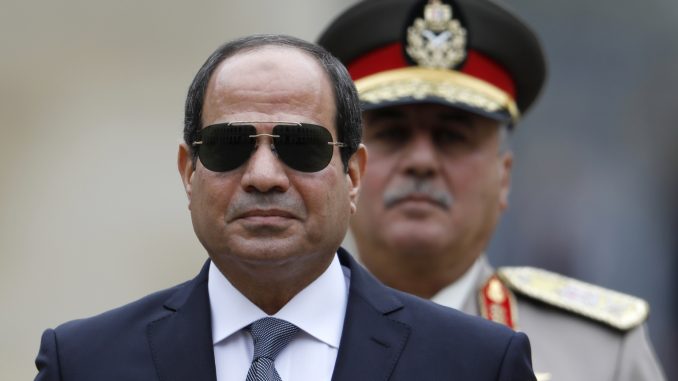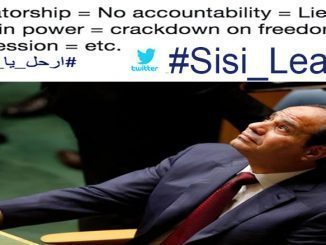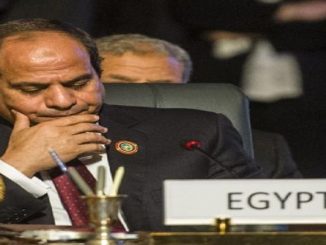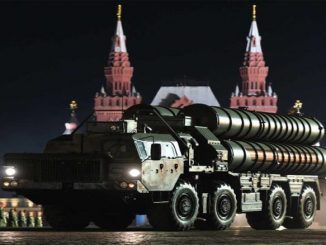
As Egypt approaches its presidential election this month, its allies and critics have largely reconciled themselves to the inevitable reelection of Abdel Fatah al-Sisi. The regime has aggressively culled the field of potential competitors through intimidation, harassment,prosecution and detention.
The U.N. human rights chief said there was a “pervasive climate of intimidation” in Egypt in the run-up to this month’s presidential elections marked by arrests, torture of detainees and “silencing”of independent media reported Reuters.
Egypt has stepped up a crackdown on media outlets it deems to be publishing reports that might harm national security, as the country approaches an election where Abdel Fattah al-Sisi is virtually guaranteed a second term, and the military fights to crush Islamic State militants in the Sinai Peninsula.
Zeid Ra’ad al-Hussein, in an annual report submitted to the United Nations Human Rights Council in Geneva, said”Potential candidates have allegedly been pressured to withdraw, some through arrests.”
He continued,”Legislation prevents candidates and supporters from organizing rallies. Independent media have been silenced, with over 400 media and NGO websites completely blocked.”
However, despite all these facts, the real struggle for Egypt’s fate will come after the election, when the regime will seek to amend the constitution to extend presidential terms and abolish term limits,according to the Washington Post.
In an article titled ” Egypt’s election is coming soon: the real battle begins afterward” the Washington Post mentioned that the real battle happens after the elections .”This could present an important opportunity for Egyptian political actors and civil society to focus attention, build alliances and begin the longer-term process of laying the groundwork to restore civilian-led politics,”said the WP.
Egypt’s Presidential Elections ” A Sham Contest”
“In a private conversation, one prominent Egyptian political leader described the coming electoral contest and its inevitable outcome as a runaway train. Most Egyptian political forces have stood clear. Those who have chosen to criticize the sham electoral contest and the increasing environment of repression have suffered severe consequences, including detention and criminal charges,”according to WP.
Egyptian authorities were initially keen to create the facade of a credible multi candidate election. Before the formal commencement of the electoral process, the Egyptian security establishment approached several individuals to gauge their interest in serving as a token candidate. However, the regime proved unable to tolerate even the prospect of carefully managed opposition and dissent.
At the last minute, the leader of the centrist Ghad party, Moussa Mostafa Moussa, entered the race. But until recently, his Facebook page was adorned with support for Sissi’s reelection bid and after declaring his candidacy he told a television host he was ” not here to challenge the president. This election clearly will not expand the boundaries of discourse or allow room for real critique.
Al-Sisi Is Avoiding Mubarak’s Safety Gauge
Washington Post said that,”This approach to elections reflects the lessons that the al-Sisi regime and its allies learned from the tumultuous events that led to the 2011 ouster of President Hosni Mubarak.”
During the latter stages of the three-decades-long Mubarak regime, the government and security establishment tolerated certain forms of dissent and opposition, such as the rise of a semi-free press.
The Mubarak regime believed that a monitored version of political life is the safety valve to Mubarak’s rule. Th regime sought that engaging opposition actors without liberalizing the political process is the best way to be in control with showing that Egypt enjoys a level of political freedom.
However, that environment encouraged activism and provided a basis for new political relationships and alliances, which eventually produced the political and social movements that led the January 2011 uprising.
Al- Sisi’s regime is resolutely avoiding any repetition of that history.
Instead, it has sought to squelch any potential opposition activity before it becomes an emerging or credible threat. This repression has gone beyond obvious targets and has produced a stultifying environment in which prosecutors have initiated outlandish legal actions shocking even staunch regime supporters.
Yet politics continue inside the regime
Meaningful politics exist now only within the regime. While al-Sisi retains control of the security establishment and continues to receive broad support within the military, his increasingly aggressive process of consolidation and personalization of rule has created clear winners and losers within the military.
The inner workings of that establishment remain largely opaque, and this lack of transparency has prompted fevered speculation about internal rivalries and fissures. Recent developments, including the sacking of very senior military and intelligence officials, clearly indicate some internal turbulence and increasing regime paranoia.
The failed electoral maneuvering by former senior military officials Ahmed Shafik and Sami Anan has exposed internal tensions within the security establishment. Despite its limitations, the high stakes of the upcoming campaign have triggered counter-responses from the establishment’s most disaffected.
Not everyone in the military is happy. Its growing economic role, which in recent years has expanded beyond its traditional domains, has highlighted internal inequality and exacerbated generational divides. Discussions with former military officers also make clear that the Sisi regime’s decision to turn over two small but strategically positioned Red Sea islands to Saudi Arabia, has triggered dissatisfaction.
These developments have alienated segments of the establishment that guarantee regime stability.
This internal disquiet and attempted electoral challenges by former senior military officials produced a swift, harsh and conspicuous response. While al-Sisi appears to believe that civilian politics poses no meaningful challenge to his authority, he remains hyper vigilant against any potential splits within the military, whose power he takes most seriously.
The Coming Battle over the Constitution
“The absence of civilian-led politics has meant the only consequential politics in the country now exists within the regime and its institutions. Combined with Egyptian society’s continuing polarization, fatigue and fear in the wake of the country’s tumultuous political transition and broader regional instability and violence, the only potential threats to regime sustainability reside within the regime itself,”said the WP.
According to the WP, “Such ruptures remain unlikely and are impossible to predict in advance, but they would be destabilizing and undemocratic if they materialized.”
Such an environment does not set the stage for a convincing renewal of al-Sisi regime’s legitimacy.
But that is not the purpose of this month’s electoral exercise. Rather, it is a procedural hurdle to clear before the much more consequential effort of constitutional change. Amending the constitution to formalize Egypt’s autocracy has previously been suggested by parliamentarians and allies of the regime.
Debate over constitutional changes also represents perhaps the only opportunity to organize domestic and international opposition to al-Sisi regime’s increasingly aggressive efforts to concentrate power in the president.
“Just as Mubarak’s efforts to engineer the succession of his son helped fuel the broad resentment that led to his downfall, the effort to establish al-Sisi as a president for life could potentially trigger serious opposition across sectors of Egyptian society and among Egypt’s international patrons,”said the WP.
If the preservation of its republican character is not sufficient to stir Egypt from its current authoritarian resurgence, it could well be locked in the destabilizing familiar old compact in which only death, coup or uprising can produce a political transition.



